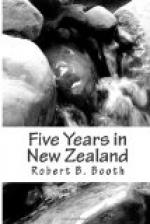From the entries it appeared that he had been fiddling along (in his usual absent manner, no doubt) very close to the edge of the Rakia bank, when a portion of it gave way under his feet, and he fell sliding and tumbling until he reached the bottom on a bed of shingle, his leg broken, and his body bruised and shattered. He succeeded in loosening the swag of blankets he had strapped on his back, wrapped them round him and lay down, occasionally calling, and always hoping against hope that some one would discover him. It was a vain hope, poor chap—not twice in a year’s space was a human being seen on that wild river bed. He lived for five days in the agonies of hunger, thirst and despair, not even a drop of water could he reach, although the river ran within twenty yards of him, and at last death mercifully put an end to his misery.
I now returned to work, continuing at the same time the study of my books, which I kept at the Ashburton, to fit me for the duties of surveyor and contractor. I was deriving a good return from my sheep and could add yearly to their number. During the remainder of the summer and autumn I worked steadily at bush work, hut-building and run-fencing, and when the winter set in I rigged up a hut in the forest, where I lived alone and earned a good return for my time in felling and cutting-up firewood for which I received from the squatters—I think—ten shillings a cord, 9 ft. by 4 ft. by 4 ft. The Ashburton Valley road had been greatly improved, and the weekly mail which hitherto ran between Christchurch and Dunedin was now made bi-weekly, and the stations on the Ashburton and Rangitata gorges arranged for a regular postman on horseback to fetch the mail from the Ashburton immediately on arrival, in lieu of the old plan of having it conveyed from one station to another by private messengers.
I recollect a ridiculous accident which happened to one of these mail carriers, who had been despatched to fetch mails across the plains. I do not think I mentioned that there were numbers of wild cats to be met with all over the country. They were not indigenous, but domestic animals or their descendants gone wild, and with their wild existence they engendered a considerable addition of strength and fierceness. The shepherd’s dog was the natural enemy of these animals.
On the occasion to which I refer, the messenger, an old Irish servant of Mr. Rowley’s, was riding quietly on one of the station hacks, a horse called “Old Dan,” a noted buckjumper in his day. Heavy saddle bags with the posts were suspended on either side, in addition to various packages tied on fore and aft. Suddenly Pat’s dog put up a cat and went away in full chase. The plain was quite open, with no trees or shrubs nearer than the river bed, half a mile distant. The cat finding herself hard pressed, and despairing of reaching the river-bed before the dog would catch her, spied old Dan with Paddy and the post thereupon, and conceived




